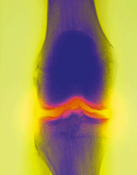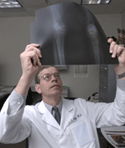
Glucosamine/Chondroitin Arthritis Intervention Trial (GAIT)
Primary and Ancillary Study Results
The Glucosamine/chondroitin Arthritis Intervention Trial (GAIT) was a large, randomized, placebo-controlled trial conducted at several sites across the United States. The GAIT team, funded by NCCAM and the National Institute of Arthritis and Musculoskeletal and Skin Diseases, actually conducted two studies:
- a primary, or original, study that investigated whether glucosamine and/or chondroitin could treat the pain of knee osteoarthritis.
- an ancillary, or additional, study that investigated whether the dietary supplements could diminish the structural damage of knee osteoarthritis.
Primary GAIT Study Results: February 2006
Researchers led by rheumatologist Daniel O. Clegg, M.D., of the University of Utah School of Medicine, conducted the 4-year primary GAIT study at 16 sites. The results, published in the New England Journal of Medicine, February 22, 2006, showed that the popular dietary supplement combination of glucosamine plus chondroitin sulfate did not provide significant relief from osteoarthritis pain among all participants. However, a smaller subgroup of study participants with moderate-to-severe pain showed significant relief with the combined supplements.
- Primary GAIT Study Press Release — summary of study results
- Questions and Answers — detailed background information on the study
- Published Article (New England Journal of Medicine)
Ancillary GAIT Study Results: October 2008
GAIT researchers led by rheumatologists Allen D. Sawitzke, M.D., and Daniel O. Clegg, M.D., both of the University of Utah School of Medicine, conducted a 2-year ancillary GAIT study at nine sites with a subset of participants from the original GAIT study. The ancillary study results, published in Arthritis & Rheumatism, October 2008, showed that glucosamine and chondroitin sulfate, together or alone, appeared to fare no better than placebo in slowing loss of cartilage in knee osteoarthritis. However, interpreting the study results is complicated because participants taking placebo had a smaller loss of cartilage, or joint space width, than predicted.
- Ancillary GAIT Study Press Release — summary of study results
- Published Article (CAM on PubMed)
Related Resources
- Handout on Health: Osteoarthritis (National Institute of Arthritis and Musculoskeletal and Skin Diseases)
- Osteoarthritis information links (MedlinePlus)

